And he sent again a captain of the third fifty with his fifty. And the third captain of fifty went up, and came and fell on his knees before Elijah, and besought him, and said unto him, O man of God, I pray thee, let my life, and the life of these fifty thy servants, be precious in thy sight. Behold, there came fire down from heaven, and burnt up the two captains of the former fifties with their fifties: therefore let my life now be precious in thy sight.
And the angel of the lord said unto Elijah, Go down with him: be not afraid of him. And he arose, and went down with him unto the king. And he said unto him, Thus saith the Lord, Forasmuch as thou hast sent messengers to enquire of Baal-zebub the god of Ekron, is it not because there is no God in Israel to enquire of his word? therefore thou shalt not come down off that bed on which thou art gone up, but shalt surely die.
So he died according to the word of the Lord which Elijah had spoken.—2 Kings i, 2-17.
http://www.gutenberg.org/files/8710/8710-h/p4.htm[28/04/11 08:34:35 ]
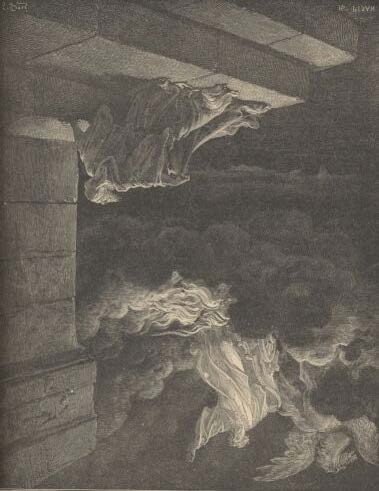
Dore Bible Gallery, Vol. 4
ELIJAH'S ASCENT IN A CHARIOT OF FIRE.
And it came to pass, when the Lord would take up Elijah into heaven by a whirlwind, that Elijah went with Elisha from Gilgal. And Elijah said unto Elisha, Tarry here, I pray thee; for the Lord hath sent me to Beth-el. And Elisha said unto him, As the Lord liveth, and as thy soul liveth, I will not leave thee. So they went down to Beth-el.
And the sons of the prophets that were at Beth-el came forth to Elisha, and said unto him, Knowest thou that the Lord will take away thy master from thy head to-day? And he said, Yea, I know it; hold ye your peace. And Elijah said unto him, Elisha, tarry here, I pray thee; for the Lord hath sent me to Jericho. And he said, As the Lord liveth, and as thy soul liveth, I will not leave thee. So they came to Jericho.
And the sons of the prophets that were at Jericho came to Elisha, and said unto him, Knowest thou that the Lord will take away thy master from thy head to-day?
And he answered, Yea, I know it; hold ye your peace. And Elijah said unto him, Tarry, I pray thee, here; for the Lord hath sent me to Jordan. And he said, As the Lord liveth, and as thy soul liveth, I will not leave thee. And they two went on.
And fifty men of the sons of the prophets went, and stood to view afar off and they two stood by Jordan.
http://www.gutenberg.org/files/8710/8710-h/p4.htm[28/04/11 08:34:35 ]
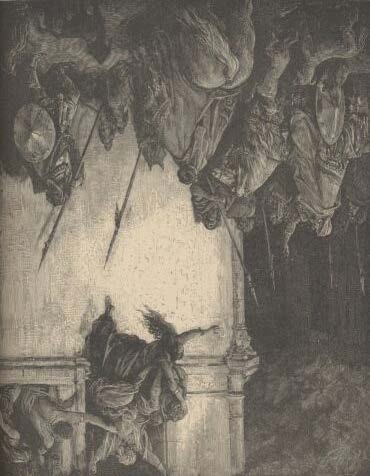
Dore Bible Gallery, Vol. 4
And Elijah took his mantle, and wrapped it together, and smote the waters, and they were divided hither and thither, so that they two went over on dry ground.
And it came to pass, when they were gone over, that Elijah said unto Elisha, Ask what I shall do for thee, before I be taken away from thee. And Elisha said, I pray thee, let a double portion of thy spirit be upon me. And he said, Thou hast asked a hard thing: nevertheless, if thou see me when I am taken from thee, it shall be so unto thee; but if not, it shall not be so.
And it came to pass, as they still went on, and talked, that, behold, there appeared a chariot of fire, and horses of fire, and parted them both asunder; and Elijah went up by a whirlwind into heaven.—2 Kings ii, I-II.
THE DEATH OF JEZEBEL.
And when Jehu was come to Jezreel, Jezebel heard of it; and she painted her face, and tired her head, and looked out at a window. And as Jehu entered in at the gate, http://www.gutenberg.org/files/8710/8710-h/p4.htm[28/04/11 08:34:35 ]
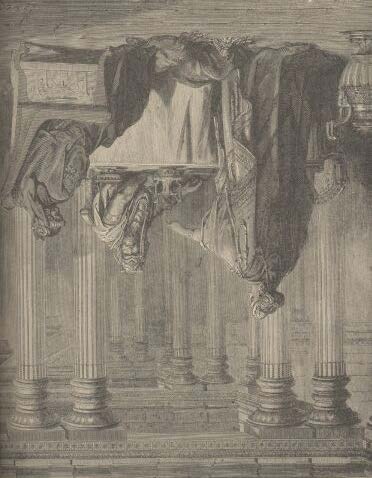
Dore Bible Gallery, Vol. 4
she said, Had Zimri peace, who slew his master?
And he lifted up his face to the window, and said, Who is on my side? who? And there looked out to him two or three eunuchs. And he said, Throw her down. So they threw her down: and some of her blood was sprinkled on the wall, and on the horses and he trod her under foot. And when he was come in, he did eat and drink, and said, Go, see now this cursed woman, and bury her: for she is a king's daughter. And they went to bury her: but they found no more of her than the skull, and the feet, and the palms of her hands. Wherefore they came again, and told him. And he said, This is the word of the Lord, which he spake by his servant Elijah the Tishbite, saying, In the portion of Jezreel shall dogs eat the flesh of Jezebel: and the carcass of Jezebel shall be as dung upon the face of the field in the portion of Jezreel; so that they shall not say, This is Jezebel.—2 Kings ix, 30-37.
ESTHER CONFOUNDING HAMAN.
So the king and Haman came to banquet with Esther the queen.
http://www.gutenberg.org/files/8710/8710-h/p4.htm[28/04/11 08:34:35 ]
Dore Bible Gallery, Vol. 4
And the king said again unto Esther on the second day at the banquet of wine What is thy petition, queen Esther? and it shall be granted thee: and what is thy request? and it shall be performed, even to the half of the kingdom.
Then Esther the queen answered and said, If I have found favor in thy sight, O
king, and if it please the king, let my life be given me at my petition, and my people at my request: for we are sold, I and my people, to be destroyed, to be slain, and to perish. But if we had been sold for bondmen and bondwomen, I had held my tongue although the enemy could not countervail the king's damage.
Then the king Ahasuerus answered and said unto Esther the queen, Who is he, and where is he, that durst presume in his heart to do so?
And Esther said, The adversary and enemy is this wicked Haman.
Then, Haman was afraid before the king and the queen. And the king arising from the banquet of wine in his wrath went into the palace garden: and Haman stood up to make request for his life to Esther the queen; for he saw that there was evil determined against him by the king.
Then the king returned out of the palace garden into the place of the banquet of wine; and Haman was fallen upon the bed whereon Esther was. Then said the king, Will he force the queen also before me in the house?
As the word went out of the king's mouth, they covered Haman's face. And Harbonah, one of the chamberlains, said before the king, Behold also, the gallows fifty cubits high, which Haman had made for Mordecai, who had spoken good for the king, standeth in the house of Haman. Then the king said, Hang him thereon.
So they hanged Haman on the gallows that he had prepared for Mordecai. Then was the king's wrath pacified.—Esther vii.
Previous Part Main Index Next Part
http://www.gutenberg.org/files/8710/8710-h/p4.htm[28/04/11 08:34:35 ]
Dore Bible Gallery, Vol. 5
Previous Part Main Index Next Part
THE DORE GALLERY OF BIBLE
ILLUSTRATIONS
By Gustave Dore
Volume 5.
With a click all images will expand to their full size http://www.gutenberg.org/files/8710/8710-h/p5.htm[28/04/11 08:34:47 ]
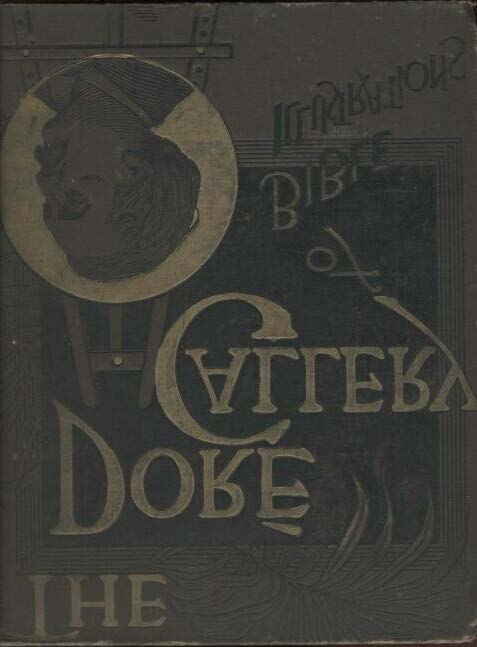
Dore Bible Gallery, Vol. 5
http://www.gutenberg.org/files/8710/8710-h/p5.htm[28/04/11 08:34:47 ]
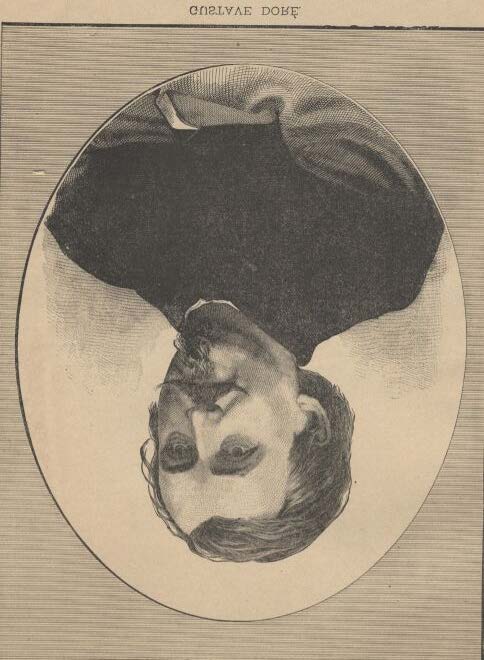
Dore Bible Gallery, Vol. 5
http://www.gutenberg.org/files/8710/8710-h/p5.htm[28/04/11 08:34:47 ]
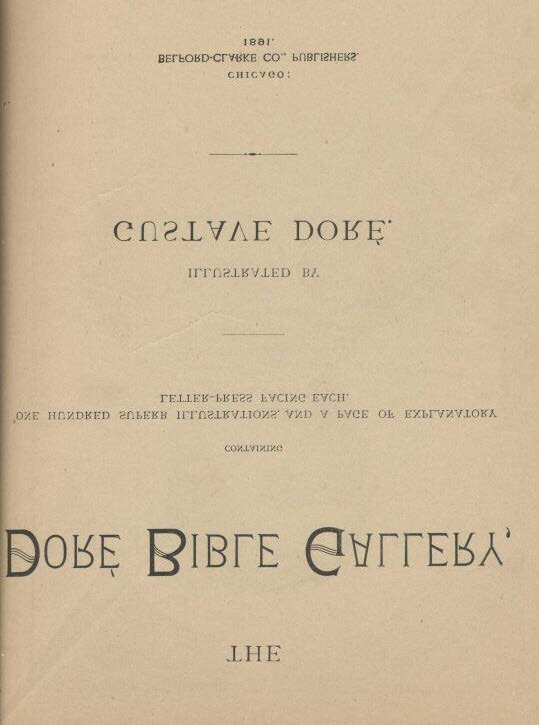
Dore Bible Gallery, Vol. 5
This volume, as its title indicates, is a collection of engravings illustrative of the Bible—the designs being all from the pencil of the greatest of modern delineators, Gustave Dore. The original work, from which this collection has been made, met with an immediate and warm recognition and acceptance among those whose means admitted of its purchase, and its popularity has in no wise diminished since its first publication, but has even extended to those who could only enjoy it casually, or in fragmentary parts. That work, however, in its entirety, was far too costly for the larger and ever-widening circle of M. Dore's admirers, and to meet the felt and http://www.gutenberg.org/files/8710/8710-h/p5.htm[28/04/11 08:34:47 ]
Dore Bible Gallery, Vol. 5
often-expressed want of this class, and to provide a volume of choice and valuable designs upon sacred subjects for art-loving Biblical students generally, this work was projected and has been carried forward. The aim has been to introduce subjects of general interest—that is, those relating to the most prominent events and personages of Scripture—those most familiar to all readers; the plates being chosen with special reference to the known taste of the American people. To each cut is prefixed a page of letter-press—in, narrative form, and containing generally a brief analysis of the design. Aside from the labors of the editor and publishers, the work, while in progress, was under the pains-taking and careful scrutiny of artists and scholars not directly interested in the undertaking, but still having a generous solicitude for its success. It is hoped, therefore, that its general plan and execution will render it acceptable both to the appreciative and friendly patrons of the great artist, and to those who would wish to possess such a work solely as a choice collection of illustrations upon sacred themes.
GUSTAVE DORE.
The subject of this sketch is, perhaps, the most original and variously gifted designer the world has ever known. At an age when most men have scarcely passed their novitiate in art, and are still under the direction and discipline of their masters and the schools, he had won a brilliant reputation, and readers and scholars everywhere were gazing on his work with ever-increasing wonder and delight at his fine fancy and multifarious gifts. He has raised illustrative art to a dignity and importance before unknown, and has developed capacities for the pencil before unsuspected. He has laid all subjects tribute to his genius, explored and embellished fields hitherto lying waste, and opened new and shining paths and vistas where none before had trod. To the works of the great he has added the lustre of his genius, bringing their beauties into clearer view and warming them to a fuller life.
His delineations of character, in the different phases of life, from the horrible to the grotesque, the grand to the comic, attest the versatility of his powers; and, whatever faults may be found by critics, the public will heartily render their quota of admiration to his magic touch, his rich and facile rendering of almost every thought that stirs, or lies yet dormant, in the human heart. It is useless to attempt a sketch of his various beauties; those who would know them best must seek them in the treasure
—house that his genius is constantly augmenting with fresh gems and wealth. To one, however, of his most prominent traits we will refer—his wonderful rendering of the powers of Nature.
His early wanderings in the wild and romantic passes of the Vosges doubtless developed this inherent tendency of his mind. There he wandered, and there, mayhap, imbibed that deep delight of wood and valley, mountain—pass and rich ravine, whose variety of form and detail seems endless to the enchanted eye. He has caught the very spell of the wilderness; she has laid her hand upon him, and he has gone forth with her blessing. So bold and truthful and minute are his countless representations of forest scenery; so delicate the tracery of branch and stem; so http://www.gutenberg.org/files/8710/8710-h/p5.htm[28/04/11 08:34:47 ]
Dore Bible Gallery, Vol. 5
patriarchal the giant boles of his woodland monarchs, that the' gazer is at once satisfied and entranced. His vistas lie slumbering with repose either in shadowy glade or fell ravine, either with glint of lake or the glad, long course of some rejoicing stream, and above all, supreme in a beauty all its own, he spreads a canopy of peerless sky, or a wilderness, perhaps, of angry storm, or peaceful stretches of soft, fleecy cloud, or heavens serene and fair—another kingdom to his teeming art, after the earth has rendered all her gifts.
Paul Gustave Dore was born in the city of Strasburg, January 10, 1833. Of his boyhood we have no very particular account. At eleven years of age, however, he essayed his first artistic creation—a set' of lithographs, published in his native city.
The following year found him in Paris, entered as a 7. student at the Charlemagne Lyceum. His first actual work began in 1848, when his fine series of sketches, the
"Labors of Hercules," was given to the public through the medium of an illustrated, journal with which he was for a long time connected as designer. In 1856 were published the illustrations for Balzac's "Contes Drolatiques" and those for "The Wandering Jew "—the first humorous and grotesque in the highest degree—indeed, showing a perfect abandonment to fancy; the other weird and supernatural, with fierce battles, shipwrecks, turbulent mobs, and nature in her most forbidding and terrible aspects. Every incident or suggestion that could possibly make the story more effective, or add to the horror of the scenes was seized upon and portrayed with wonderful power. These at once gave the young designer a great reputation, which was still more enhanced by his subsequent works.
With all his love for nature and his power of interpreting her in her varying moods, Dore was a dreamer, and many of his finest achievements were in the realm of the imagination. But he was at home in the actual world also, as witness his designs for
"Atala," "London—a Pilgrimage," and many of the scenes in "Don Quixote."
When account is taken of the variety of his designs, and the fact considered that in almost every task he attempted none had ventured before him, the amount of work he accomplished is fairly incredible. To enumerate the immense tasks he undertook
—some single volumes alone containing hundreds of illustrations—will give some faint idea of his industry. Besides those already mentioned are Montaigne, Dante, the Bible, Milton, Rabelais, Tennyson's "Idyls of the King," "The Ancient Mariner, Shakespeare, "Legende de Croquemitaine," La Fontaine's "Fables," and others still.
Take one of these works—the Dante, La Fontaine, or "Don Quixote"—and glance at the pictures. The mere hand labor involved in their production is surprising; but when the quality of the work is properly estimated, what he accomplished seems prodigious. No particular mention need be made of him as painter or sculptor, for his reputation rests solely upon his work as an illustrator.
Dore's nature was exuberant and buoyant, and he was youthful in appearance. He had a passion for music, possessed rare skill as a violinist, and it is assumed that, had he failed to succeed with his pencil, he could have won a brilliant reputation as a musician.
He was a bachelor, and lived a quiet, retired life with his mother—married, as he expressed it, to her and his art. His death occurred on January 23, 1883.
http://www.gutenberg.org/files/8710/8710-h/p5.htm[28/04/11 08:34:47 ]
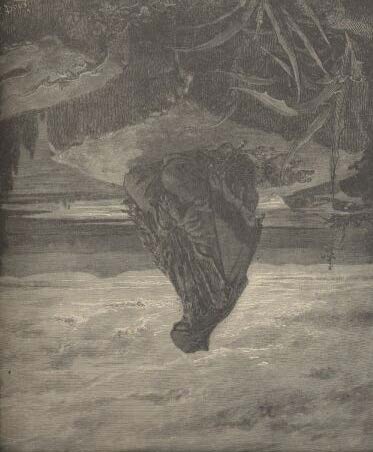
Dore Bible Gallery, Vol. 5
LIST OF ILLUSTRATIONS
GUSTAVE DORE
ISAIAH
DESTRUCTION OF SENNACHERIB'S HOST
BARUCH
EZEKIEL PROPHESYING
THE VISION OF EZEKIEL
DANIEL
THE FIERY FURNACE
BELSHAZZAR'S FEAST
DANIEL IN THE LION'S DEN
THE PROPHET AMOS
JONAH CALLING NINEVEH TO REPENTANCE
DANIEL CONFOUNDING THE PRIESTS OF BEL
HELIODORUS PUNISHED IN THE TEMPLE
ISAIAH.
http://www.gutenberg.org/files/8710/8710-h/p5.htm[28/04/11 08:34:47 ]
Dore Bible Gallery, Vol. 5
Isaiah (in Hebrew, Yeshayahu, "Salvation of God"), the earliest and most sublime of the four greater Hebrew prophets, was the son of Amoz (2 Kings xix, 2-20; Isaiah xxxvii, 2), and he uttered his oracles during the reigns of Uzziah, Jotham, Ahaz, and Hezekiah, kings of Judah. The dates of his birth and death are unknown, but he lived from about 760 B.C. to about 700 B.C. He was married and had three sons—the children referred to in Isaiah viii, 18; and he appears to have resided near Jerusalem.
But by most competent critics it is now held that the last twenty-seven chapters (40-66) of the book bearing his name were the work, not of the prophet, but of a later writer who is commonly styled the second or Deutero-Isaiah. In this portion of the book, Cyrus, who was not born till after 600 B.C., is mentioned by name (Isaiah, xliv, 28; xlv, i); and events which did not take place till a century after the prophet's death are referred to as happening contemporaneously with the writer's account of them. The style of these last twenty-seven chapters, also, is different, and the tone is more elevated and spiritual.
Dore's ideal portrait is more suited to the second or pseudo-Isaiah, than to the real one.
DESTRUCTION OF SENNACHERIB'S HOST.
http://www.gutenberg.org/files/8710/8710-h/p5.htm[28/04/11 08:34:47 ]
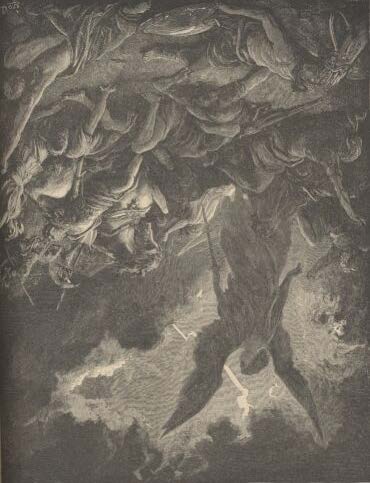
Dore Bible Gallery, Vol. 5
Therefore thus saith the Lord concerning the king of Assyria, He shall not come into this city, nor shoot an arrow there, nor come before it with shield, nor cast a bank against it. By the way that he came, by the same shall he return, and shall not come into this city, saith the Lord. For I will defend this city, to save it, for mine own sake, and for my servant David's sake.
And it came to pass that night that the angel of the Lord went out, and smote in the camp of the Assyrians an hundred fourscore and five thousand: and when they arose early in the morning, behold, they were all dead corpses.
So Sennacherib king of Assyria departed, and went and returned, and dwelt at Nineveh. And it came to pass, as he was worshipping in the house of Nisroch his god, that Adrammelech and Sharezer his sons smote him with the sword: and they escaped into the land of Armenia. And Esar-haddon his son reigned in his stead.—2
Kings xix, 32-37
BARUCH.
http://www.gutenberg.org/files/8710/8710-h/p5.htm[28/04/11 08:34:47 ]
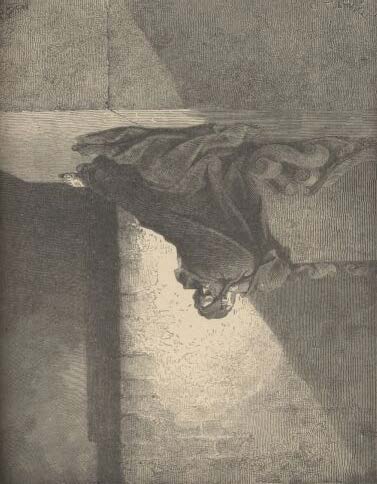
Dore Bible Gallery, Vol. 5
And it came to pass in the fourth year of Jehoiakim the son of Josiah king of Judah, that this word came unto Jeremiah from the Lord, saying, Take thee a roll of a book, and write therein all the words that I have spoken unto thee against Israel, and against Judah, and against all the nations, from the day I spake unto thee, from the days of Josiah, even unto this day. It may be that the house of Judah will hear all the evil which I purpose to do unto them; that they may return every man from his evil way; that I may forgive their iniquity and their sin.
Then Jeremiah called Baruch the son of Neriah: and Baruch wrote from the mouth of Jeremiah all the words of the Lord, which he had spoken unto him, upon a roll of a book. Jeremiah xxxvi; 1-4.
The word that Jeremiah the prophet spake unto Baruch the son of Neriah, when he had written these words in a book at the mouth of Jeremiah, in the fourth year of Jehoiakim the son of Josiah king of Judah, saying, Thus saith the Lord, the God of Israel, unto thee, O Baruch; thou didst say, Woe is me now! for the Lord hath added grief to my sorrow; I fainted in my sighing, and I find no rest.
Thus shalt thou say unto him, The Lord saith thus; Behold, that which I have built will I break down, and that which I have planted I will pluck up, even this whole land. And seekest thou great things for thyself? seek them not: for, behold, I will bring evil upon all flesh, saith the Lord: but thy life will I give unto thee for a prey in all places whither thou goesth. Jeremiah xlv, 1-5.
http://www.gutenberg.org/files/8710/8710-h/p5.htm[28/04/11 08:34:47 ]
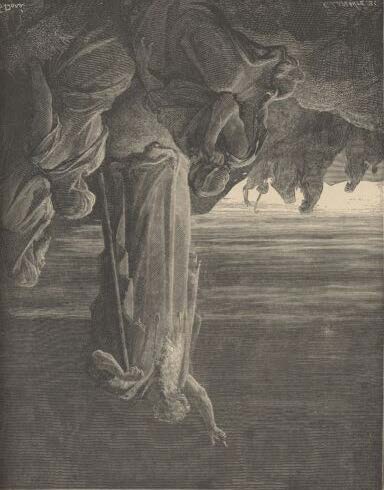
Dore Bible Gallery, Vol. 5
EZEKIEL PROPHESYING.
Ezekiel, the third of the great Hebrew prophets, was the son of the priest Buzi.
(Ezekiel i, 3). He was probably born about 620 or 630 years before Christ, and was consequently a contemporary of Jeremiah and Daniel, to the latter of whom he alludes in chapters xiv, 14-20 and xxviii, 3. When Jerusalem was taken by Nebuchadnezzar in 597 B.C. (2 Kings xxiv, 8-16; Jeremiah xxix, 1-2; Ezekiel xvii, 12; xix, 9), Ezekiel was carried captive along with Jehoiachin, or Jeconiah, king of Judah, and thousands of other Jewish prisoners, to Babylonia, or as he himself calls it, "the land of the Chaldeans." (Ezekiel i, 3). Here, along with his exiled fellow-countrymen, he lived on the banks of the river Chebar (Ezekiel i, 1-3), in a house of his own (viii, i). Here also he married, and here, too, his wife, "the desire of his eyes," was taken from him "with a stroke" (Ezekiel xxiv, 15-18). His prophetic career extended over twenty-two years, from about 592 B.C. to about 570 B.C.
The book bearing his name is written in a mystical and symbolical style, and abounds with visions and difficult allegories which indicate on the part of the author http://www.gutenberg.org/files/8710/8710-h/p5.htm[28/04/11 08:34:47 ]
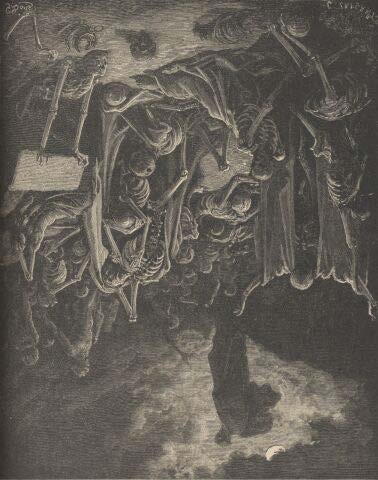
Dore Bible Gallery, Vol. 5
the possession of a vivid and sublime imagination. Ezekiel's authorship of it has been questioned. The Talmud attributes it to the Great Synagogue, of which Ezekiel was not a member. It is divisible into two portions. The first (chapters i-xxiv) was written before, and the second (chapters xxv-xlviii) after, the destruction of Jerusalem by Nebuchadnezzar in 586 B.C, the eleventh year of the prophet's captivity (Ezekiel xxvi, 1-2; XI, i). The present text is very imperfect, being corrupted by the interpolation of glosses and other additions by later hands.
Dore's picture represents the prophet uttering his oracles to his fellow-exiles ("them of the captivity"), or to the "elders of Judah," or "elders of Israel," on one of the occasions to which he himself alludes (viii, I; xi, 25; xiv, I; xx, I).
THE VISION OF EZEKIEL.
The hand of the Lord was upon me, and carried me out in the Spirit of the Lord, and set me down in the midst of the valley which was full of bones, and caused me to pass by them round about: and, behold, there were very many in the open valley; http://www.gutenberg.org/files/8710/8710-h/p5.htm[28/04/11 08:34:47 ]
Dore Bible Gallery, Vol. 5
and, lo, they were very dry.
And he said unto me; Son of man, can these bones live? And I answered, O Lord God, thou knowest.
Again he said unto me, Prophesy upon these bones, and say unto them, O ye dry bones, hear the word of the Lord. Thus saith the Lord God unto these bones; Behold, I will cause breath to enter into you, and ye shall live: And I will lay sinews upon you, and will bring up flesh upon you, and cover you with skin, and put breath in you, and ye shall live and ye shall know that I am the Lord.
So I prophesied as I was commanded: and as I prophesied, there was a noise, and behold a shaking, and the, bones came together, bone to his bone. And when I beheld, lo, the sinews and the flesh came up upon them, and the skin covered them above: but there was no breath in them.
Then said he unto me, Prophesy unto the wind, prophesy, son of man, and say to the wind, Thus saith the Lord God; Come from the four winds, O breath, and breathe upon these slain, that they may live.
So I prophesied as he commanded me, and the breath came into them, and they lived, and stood up upon their feet, an exceeding great army.
Then he said unto me, Son of man, these bones are the whole house of Israel: behold, they say, Our bones are dried, and our hope is lost: we are cut off for our parts. Therefore prophesy and say unto them, Thus saith the Lord God; Behold, O
my people, I will open your graves, and cause you to come up out of your graves, and bring you into the land of Israel. And ye shall know that I am the Lord, when I have opened your graves, O my people, and brought you up out of your graves, and shall put my Spirit in you, and ye shall live, and I shall place you in your own land: then shall ye know that I the Lord have spoken it, and performed it, saith the Lord.
—Ezekiel xxxvii, 1-14.
DANIEL.
http://www.gutenberg.org/files/8710/8710-h/p5.htm[28/04/11 08:34:47 ]
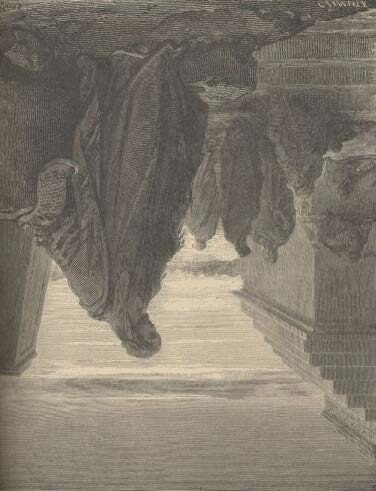
Dore Bible Gallery, Vol. 5
Respecting the parentage or family of Daniel, the fourth of the great Hebrew prophets, nothing is known, though he appears to have been of noble if not of royal descent (Daniel i, 3). When, in the third year of the reign of King Jehoiakim (607, 606, 605, or 604 B.C.), Jerusalem was first taken by Nebuchadnezzar, Daniel, then a youth, was among the captives carried to Babylon. By the king's orders, he, with others of the Jewish youth, was educated for three years (Daniel i, 3-7). At this time Daniel acquired the power of interpreting dreams (i, 17), which he used with such advantage in expounding a dream of Nebuchadnezzar, that he was made ruler over the whole province of Babylon (Daniel ii, 46-48). Daniel's interpretation of Belshazzar's famous vision having been fulfilled by the capture of Babylon by Darius, that conqueror promoted Daniel to the highest office in the kingdom (Daniel vi, 1-3). The prophet also prospered greatly during the reign of Cyrus (Daniel vi, 28).
The book of Daniel is written partly in Chaldaic or Syriac (the vernacular Aramaic language spoken by the people of Palestine), and partly in sacred Hebrew. It is manifestly divisible into two portions. The first (chapters i-vi) narrating the details of the prophet's life, and the second (chapters vii-xii) setting forth his apocalyptic visions. Much doubt has been cast upon the authenticity of the work. The evident reference in the eleventh chapter to the conquest of Persia by Alexander the Great, which took place about 330 B.C., or more than two hundred years after Daniel flourished, has led many modern critics to believe that the work was composed in the time of the Maccabees.
Dore's picture appears to be intended to represent the prophet meditating over one of the many visions which came to him.
http://www.gutenberg.org/files/8710/8710-h/p5.htm[28/04/11 08:34:47 ]
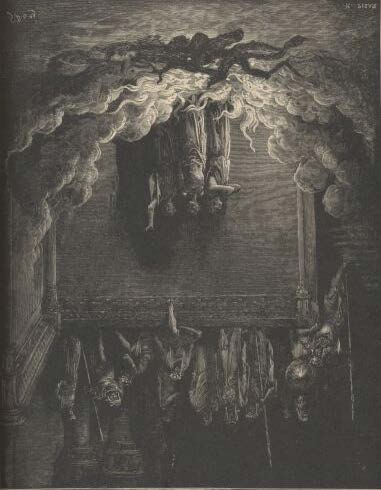
Dore Bible Gallery, Vol. 5
THE FIERY FURNACE.
Wherefore at that time certain Chaldeans came near, and accused the Jews. They spake and said to the king Nebuchadnezzar, O king, live forever. There are certain Jews whom thou hast set over the affairs of the province of Babylon, Shadrach, Meshach, and Abed-nego; these men, O king, have not regarded thee: they serve not thy gods, nor worship the golden image which thou hast set up.
















